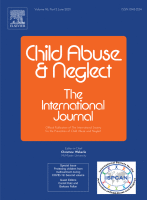Displaying 321 - 330 of 2509
"The Ontario government is engaging youth with lived experience to help develop a new framework that would see youth transition out of the care of children’s aid societies when they feel ready and better prepared," says this news release from the government of Ontario, Canada.
The purpose of this study was to present an illustrative test of whether an algorithmic decision aid could be used to identify youth at risk of exiting foster care without permanency.
The purpose of this critically appraised topic was to analyze the effectiveness of transitional programming for youth leaving the foster care system on increasing abilities of community integration.
"The U.S. Customs and Border Protection agency is still expelling most migrants under a Trump policy indefinitely closing the border during the pandemic to 'nonessential' travel," says this article from the Los Angeles Times, "though the Biden administration in February announced it would exempt unaccompanied children."
The aim of this study was to examine the academic trajectories of children in out-of-home care (OOCH) and whether kinship care has a protective effect relative to nonkin foster care.
This study utilized secondary data from National Survey of Child and Adolescent Well-being (NSCAW II) to examine the experiences of 298 youth and their caregivers.
The current discussion paper explored the impact of COVID-19 on child maltreatment reports and CPS responses by comparing countries using available population data.
In this article, researchers Philip Fisher, Joan Lombardi, and Nat Kendall-Taylor present data from the RAPID-EC U.S. national survey of families with young children and look back at three overarching findings from the first year of the survey.
The current study assessed the efficacy of the Attachment and Biobehavioral Catch-up intervention for reducing behavior problems in 122 children adopted internationally.
This webinar sheds light on the often under-the-radar work and impact of more than 3,000 Family Resource Centers in the U.S.

